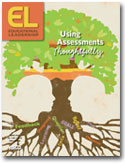Although educators' roles are unique, there is much that we can learn from other arenas and professions. Observing how students engage in learning at a children's museum offers obvious lessons. The array of metrics used in health care to monitor patient health demonstrates what might happen with assessing students' learning. And then there are restaurants. What can school leaders learn from restaurateurs? A lot, it turns out.
I've just finished reading Danny Meyer's book, Setting the Table (HarperCollins, 2006), and I'm struck by how many of his anecdotes and principles are directly applicable to schools. Really good restaurants do more than offer high-quality food, just as really good schools do more than impart skills and knowledge. Meyer, a famous New York restaurateur, says that "food is secondary to something that matters even more. In the end, what's most meaningful is creating positive, uplifting outcomes for human experiences and human relationships. Business, like life, is all about how you make people feel. It's that simple, and it's that hard."
Meyer captures the value of relationships by distinguishing between service and hospitality: "Service is the technical delivery of a product. Hospitality is how the delivery of that product makes the recipient feel. Service is a monologue—we decide how we want to do things and set our own standards for service. Hospitality, on the other hand, is a dialogue." That dialogue is rich with implications and possibilities. Meyer continues, "To be on a guest's side requires listening to that person with every sense, and following up with a thoughtful, gracious, appropriate response. It takes both great service and great hospitality to rise to the top."
This is true in schools, too. Service, even good service, isn't sufficient. We must strive for hospitality and the relationships it makes possible. That hospitality orientation applies to my three main audiences: staff, students, and students' families. Thinking about their education journey—not just the outcome (comparable to Meyer's focus on the experience and the relationships, not just the food)—reminds me that how we learn is powerful in determining our success and in fostering our attitudes about learning. The hospitality context that administrators set is crucial.
For staff, do we celebrate their successes? Are expectations clear and roles delineated, but with enough room for discretion to allow for a personal touch? Do staff members feel that it's their school, or just a place they go to work?
For students, do the walls and halls welcome everyone? Going beyond the honor roll and trophies, are there signs applauding effort and grit? Can students use different intelligences in learning? Do students feel that it's their school, or just a place they go to learn?
For students' families, do we make them feel welcome beyond those days when conferences, games, or performances are scheduled? Do we regularly inform them about what we are doing and why we are doing it? Do families feel that it's their school, or just a place their children attend?
A feeling of shared ownership, in which "patrons" feel that the "restaurant" is theirs, too, should be our goal. Meyer says, "I instruct my staff members to figure out whatever it takes to make the guests feel and understand that we are in their corner." What about us? How can we engender a feeling of pride and loyalty besides at pep rallies? How can we elicit a feeling of ownership in all constituencies?
It's important that teachers, students, and parents know that I am their advocate. I need to ask questions, and I need to listen so that they can help me frame what happens at the school, not just participate in it. It's efficient to make a quick, unilateral decision, but dialogue is always better than monologue. "Poor communication is generally not a matter of miscommunication," says Meyer. "More often, it involves taking away people's feeling of control." My answer is rarely better than our solution.
Setting the table means more than arranging silverware. Meyer also talks about the importance of having the right staff: "The only way a company can grow, stay true to its soul, and remain consistently successful is to attract, hire, and keep great people." Amen to that! I found it interesting that Meyer identifies the same essential qualities in his employees that I value in my teachers—optimism, intelligence, work ethic, empathy, self-awareness, and integrity.
I also agree with his point that "a mark of a champion is to welcome scrutiny, persevere, perform beyond expectations, and provide an exceptional product—for which forgiveness is not necessary." More and more, I understand that receptivity to feedback and a willingness to reflect are integral to growth. Inherent in that receptivity is an ability to learn from mistakes rather than seeking to avoid them at all costs.
Reflecting on the difference between service and hospitality helps me think about what needs to happen throughout the entire education process instead of just focusing on the outcomes. And improving the process will help us achieve those outcomes. I know that I would enjoy talking with Danny Meyer about organizations and culture. And what a treat it would be to eat at one of his restaurants!
What about you and your school? With whom could you begin a dialogue about service versus hospitality?

